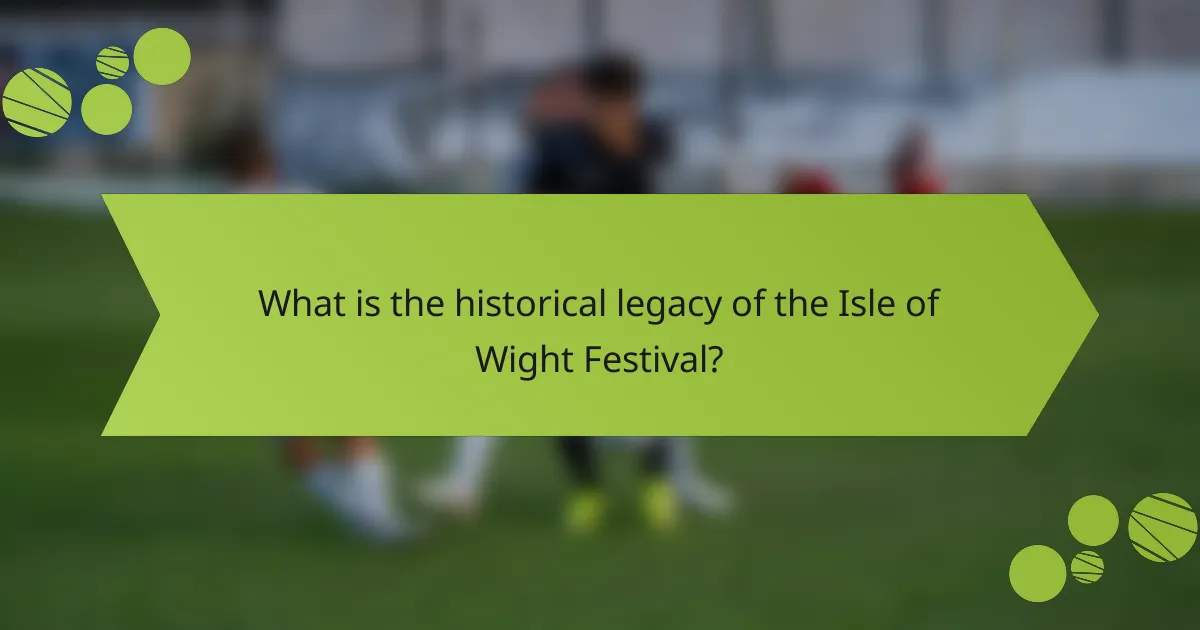The Isle of Wight Festival is a prominent annual music event held on the Isle of Wight, England, since its inception in 1968. Known for its vibrant atmosphere and diverse lineup, the festival has hosted legendary performances by iconic artists such as Jimi Hendrix and The Who. Beyond music, the festival has served as a platform for social movements, addressing issues related to peace, equality, and environmentalism. Its historical significance is marked by its influence on music festival culture, community engagement, and activism, making it a key player in both the entertainment industry and social change initiatives.

What is the Isle of Wight Festival?
The Isle of Wight Festival is a major music festival held annually on the Isle of Wight, England. It began in 1968 and has featured numerous iconic performances. Notable artists like Jimi Hendrix and The Who have performed at the festival. The festival is known for its vibrant atmosphere and diverse lineup. It attracts thousands of attendees each year. The event has played a significant role in the history of music festivals. Its legacy includes influencing the festival culture in the UK and beyond.
How did the Isle of Wight Festival originate?
The Isle of Wight Festival originated in 1968 as a music festival. It was established by Ray Foulk and his brother, who aimed to create an event that would showcase popular music. The first festival featured artists such as Bob Dylan and The Who. It attracted an audience of around 10,000 people. The festival’s success led to its revival in 1970, drawing larger crowds. The 1970 event became iconic, featuring Jimi Hendrix’s last UK performance. Over the years, the Isle of Wight Festival has evolved into a major music event. It continues to celebrate musical heritage and cultural significance.
What were the key events leading to its establishment?
The Isle of Wight Festival was established following several key events. In 1968, the first festival took place, organized by Ray Foulk. This event was influenced by the success of the Monterey Pop Festival in California. The 1969 festival featured prominent artists like Bob Dylan and The Who, attracting a large audience. The 1970 festival aimed to expand its reach, resulting in a significant increase in attendance. The local government initially opposed the festival due to concerns over crowd control and environmental impact. However, the festival’s cultural significance led to its eventual acceptance and establishment as a major music event.
Who were the founders and early organizers of the festival?
The Isle of Wight Festival was founded by Ray Foulk, who played a pivotal role in its organization. Foulk, along with his brothers, organized the first festival in 1968. They aimed to create a space for music and cultural expression. The festival’s early organizers included notable figures like John Giddings, who later became an influential promoter. The inaugural event featured iconic performances from artists such as Jimi Hendrix and The Who. This foundation established the festival as a significant cultural event in the 1960s. The organizers’ vision contributed to the festival’s legacy as a landmark in music history.
What makes the Isle of Wight Festival significant in music history?
The Isle of Wight Festival is significant in music history as it was one of the first major music festivals to attract a massive audience. In 1970, it drew over 600,000 attendees, making it one of the largest gatherings of its time. The festival featured iconic performances from legendary artists such as Jimi Hendrix, The Who, and Bob Dylan. It played a crucial role in shaping the festival culture that followed in the 1970s and beyond. The event also highlighted the counterculture movement of the era, reflecting social and political sentiments. Its legacy continues to influence contemporary music festivals worldwide.
How did the festival influence the music scene in the late 1960s and early 1970s?
The Isle of Wight Festival significantly influenced the music scene in the late 1960s and early 1970s. It showcased legendary performances by artists like Jimi Hendrix and The Who. This festival highlighted the importance of live music events during that era. It helped to establish the festival culture that became prevalent in the following years. The festival also served as a platform for emerging artists, allowing them to gain exposure. Its large attendance demonstrated the growing popularity of rock music. The festival’s atmosphere encouraged artistic experimentation and collaboration. Overall, it played a crucial role in shaping the musical landscape of the time.
What iconic performances have taken place at the festival?
The Isle of Wight Festival has hosted several iconic performances. Jimi Hendrix’s 1970 performance is legendary, showcasing his guitar prowess. The Who also delivered a memorable set in 1970, featuring their rock opera “Tommy.” Bob Dylan’s 1969 appearance marked his return to the stage after a hiatus. Additionally, Leonard Cohen’s haunting performance in 1970 captivated the audience. These performances are significant in music history, drawing large crowds and influencing future festivals. Each act contributed to the festival’s reputation as a pivotal moment in rock music.

How has the Isle of Wight Festival contributed to social movements?
The Isle of Wight Festival has significantly contributed to social movements by providing a platform for political expression and cultural change. Established in 1968, the festival became a gathering for counterculture and activism. It showcased performances by artists who addressed social issues, such as peace, equality, and environmentalism. Notably, the 1970 festival featured renowned acts like Jimi Hendrix and The Who, drawing attention to the anti-war sentiment of the era. The festival also fostered community solidarity and engagement among attendees, promoting a sense of shared purpose. Over the years, it has continued to support various causes, including environmental awareness and human rights initiatives. The festival’s legacy is evident in its ongoing influence on music and activism, inspiring future generations to advocate for social change.
What role did the festival play in the counterculture of the 1960s?
The festival served as a pivotal gathering for the counterculture of the 1960s. It provided a platform for artists and musicians who challenged societal norms. Iconic performances by figures like Jimi Hendrix and The Who drew large crowds. These events fostered a sense of community among attendees. The festival promoted ideals of peace, love, and artistic expression. It symbolized resistance against mainstream culture and consumerism. Additionally, it highlighted the growing anti-establishment sentiments of the era. The festival’s impact contributed to the broader cultural revolution of the 1960s.
How did the festival serve as a platform for social change?
The festival served as a platform for social change by promoting counterculture values and raising awareness of social issues. It featured performances that highlighted themes of peace, love, and freedom. Artists like Jimi Hendrix and Joan Baez used their music to address political and social injustices. The festival attracted diverse audiences, fostering unity among different social groups. It became a space for dialogue on topics such as civil rights and anti-war sentiments. The Isle of Wight Festival symbolized the shift in societal norms during the late 1960s. Its legacy continues to inspire social movements today.
What notable political statements were made during the festival?
Notable political statements made during the Isle of Wight Festival include calls for peace and social justice. Artists like Bob Dylan and Joan Baez used their platforms to address anti-war sentiments. The festival also featured speeches advocating for civil rights and environmental awareness. These statements resonated with the youth culture of the time. The emphasis on activism reflected broader societal movements in the 1960s. The festival became a symbol of counterculture and political expression.
How has the Isle of Wight Festival evolved over the years?
The Isle of Wight Festival has evolved significantly since its inception in 1968. Initially, it featured iconic performances from artists like Jimi Hendrix and The Doors. The festival was known for its countercultural atmosphere and large crowds. After a hiatus, it returned in 2002 with a more commercial focus. The lineup expanded to include mainstream artists, attracting a wider audience. Over the years, it has incorporated various music genres, reflecting changing musical trends. The festival has also embraced sustainability initiatives in recent years. Attendance numbers have varied, peaking at over 60,000 in 2019. This evolution highlights the festival’s adaptability and enduring relevance in the music scene.
What changes have occurred in the festival’s lineup and audience demographics?
The festival’s lineup has evolved to include a diverse range of genres and artists. Recent years have seen an increase in electronic and pop acts. This shift reflects broader music trends and audience preferences. Audience demographics have also changed significantly. The festival now attracts a younger crowd alongside its traditional older attendees. Data from recent events indicates a rise in attendees aged 18 to 30. This demographic shift is attributed to targeted marketing and social media engagement. Overall, the festival has adapted to maintain relevance in the changing music landscape.
How has the festival adapted to modern music trends?
The Isle of Wight Festival has adapted to modern music trends by incorporating diverse genres and artists. It now features a mix of pop, rock, electronic, and indie music. This shift reflects the evolving tastes of younger audiences. In recent years, the festival has included prominent contemporary acts alongside classic performers. For example, artists like Ed Sheeran and The Killers have headlined. The festival also embraces technology by enhancing the audience experience with mobile apps and live streaming. This modernization attracts a broader demographic and maintains relevance in the music industry.

What is the historical legacy of the Isle of Wight Festival?
The historical legacy of the Isle of Wight Festival is significant in the evolution of music festivals. Established in 1968, it showcased legendary performances by artists like Jimi Hendrix and The Who. The festival symbolized the counterculture movement of the 1960s. It attracted a diverse audience, promoting peace and unity through music. The 1970 festival drew over 600,000 attendees, making it one of the largest festivals of its time. Its impact influenced future festivals worldwide, setting standards for organization and artist lineups. The festival’s legacy continues to inspire contemporary music events, reflecting its lasting cultural relevance.
How is the Isle of Wight Festival remembered today?
The Isle of Wight Festival is remembered today as a pivotal moment in music history. It is celebrated for its iconic performances, featuring legendary artists like Jimi Hendrix and The Who. The festival symbolizes the counterculture movement of the late 1960s. It attracted an audience of over 600,000 in 1970, making it one of the largest music festivals of its time. The festival’s legacy includes its influence on modern music festivals and its role in promoting peace and unity. Today, it is recognized for its historical significance and cultural impact. The festival continues to inspire new generations of music lovers and artists alike.
What impact has the festival had on subsequent music festivals?
The Isle of Wight Festival has significantly influenced subsequent music festivals. It set a precedent for large-scale outdoor events. The festival demonstrated the viability of multi-day music gatherings. Its success inspired similar festivals worldwide, such as Glastonbury and Coachella. The Isle of Wight Festival showcased iconic performances that elevated artist visibility. This encouraged a focus on headliners and diverse lineups in future festivals. The festival also highlighted the importance of audience experience and amenities. Organizers began to prioritize comfort and accessibility at subsequent events.
How does the festival celebrate its historical roots in contemporary events?
The festival celebrates its historical roots by incorporating elements that reflect its origin. It features performances by artists who were pivotal during the festival’s inception in the late 1960s. These artists often include legendary acts that resonate with the festival’s legacy. Additionally, the festival hosts discussions and workshops that highlight the social movements associated with its history. These events educate attendees about the cultural significance of the festival’s past. The festival also showcases art installations that depict historical moments from previous years. This blend of music, education, and art creates a comprehensive celebration of its heritage. By honoring its roots, the festival maintains a connection to its original vision and purpose.
What are the future prospects for the Isle of Wight Festival?
The future prospects for the Isle of Wight Festival appear positive. The festival has a rich history and strong brand recognition. It attracts a diverse audience each year. Recent lineups have featured popular artists, enhancing its appeal. Attendance numbers have shown resilience post-pandemic. The festival’s commitment to sustainability may attract environmentally conscious attendees. Partnerships with local businesses can boost community support. Ongoing investment in infrastructure will improve attendee experience. Overall, these factors suggest a bright future for the festival.
How might the festival continue to influence music and culture?
The Isle of Wight Festival might continue to influence music and culture through its legacy of iconic performances. The festival has historically showcased groundbreaking artists who have shaped musical genres. This exposure helps emerging artists gain recognition and inspiration. The festival also fosters a sense of community among diverse musical styles. Its emphasis on social movements resonates with contemporary cultural issues. Events like this encourage collaboration between artists and activists. The festival’s ongoing popularity attracts global attention, reinforcing its cultural significance. As new generations attend, they carry forward its traditions and values.
What initiatives are in place to preserve the festival’s legacy?
The Isle of Wight Festival has several initiatives to preserve its legacy. The festival’s organizers maintain an archive of historical documents and recordings. This archive includes footage of past performances and interviews with artists. Educational programs are offered to engage younger audiences about the festival’s history. Collaborations with local schools promote awareness of the festival’s cultural impact. Annual commemorative events celebrate the festival’s milestones. Community engagement initiatives involve local residents in planning and activities. These efforts ensure that the festival’s history is remembered and appreciated.
What tips can attendees follow to enhance their Isle of Wight Festival experience?
Arrive early to secure a good camping spot. This allows attendees to set up and explore the festival grounds. Plan a schedule to catch favorite acts and explore different stages. Bring essential items like water, sunscreen, and portable chargers for convenience. Dress comfortably and prepare for varying weather conditions. Engage with fellow attendees to enhance the social experience. Familiarize yourself with the festival layout to navigate easily. Participate in onsite activities for a more immersive experience.
How can festival-goers prepare for the event?
Festival-goers can prepare for the event by planning their itinerary in advance. They should research the lineup of performers and set a schedule for must-see acts. Booking accommodations early is crucial, as nearby options fill up quickly. Packing essentials like sunscreen, water bottles, and comfortable clothing enhances the experience. Familiarizing themselves with the festival’s layout helps in navigating the venue efficiently. Staying updated on weather forecasts allows for appropriate clothing choices. Purchasing tickets ahead of time prevents last-minute hassles. Lastly, engaging with festival communities online can provide valuable tips and insights.
What are the best practices for enjoying performances at the festival?
Arrive early to secure a good viewing spot for performances. This allows you to enjoy the atmosphere and engage with fellow festival-goers. Stay hydrated and eat regularly to maintain energy levels throughout the event. Comfortable clothing and footwear enhance your experience, especially during long hours of standing. Familiarize yourself with the festival schedule to plan which acts to see. Respect the performers and fellow audience members by minimizing distractions, such as phone use. Participate in the festival community by engaging in discussions and sharing experiences. Lastly, embrace the diversity of performances to broaden your appreciation of different music genres and cultures.
The Isle of Wight Festival is a significant annual music event that originated in 1968, known for its iconic performances by legendary artists such as Jimi Hendrix and The Who. The festival has played a crucial role in shaping music culture, influencing both the counterculture movement of the 1960s and the evolution of modern music festivals. It serves as a platform for social change, promoting themes of peace and activism through music. This article explores the festival’s historical legacy, its impact on subsequent music events, and tips for enhancing the attendee experience.